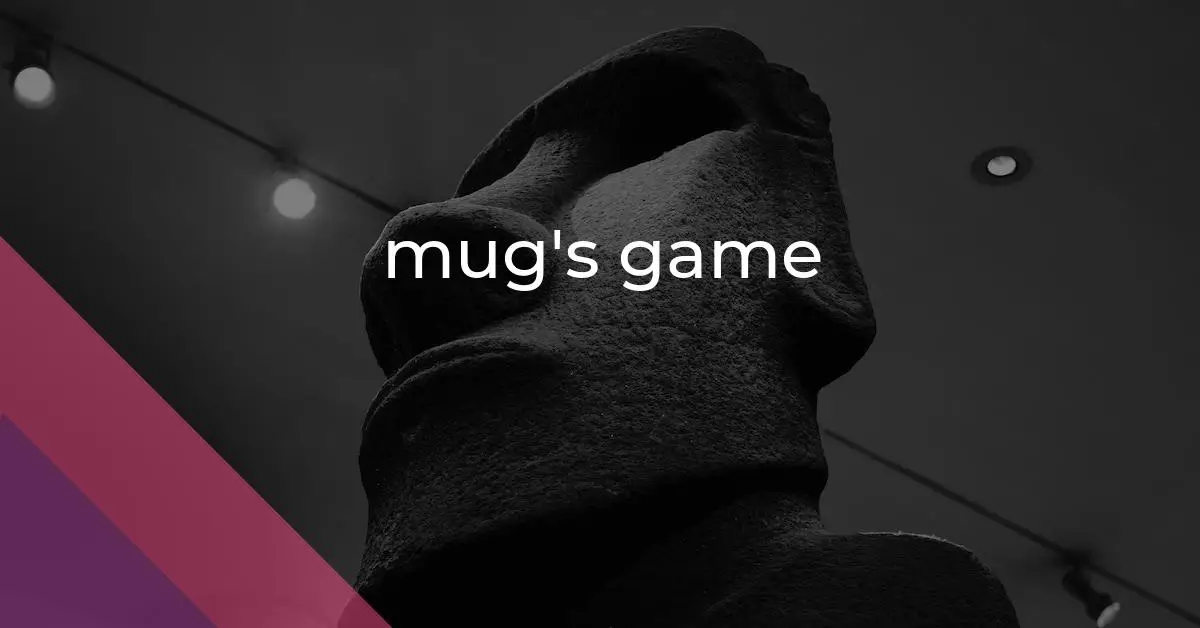mug’s game: Idiom Meaning and Origin
What does ‘mug's game’ mean?
An idiom meaning a foolish or pointless activity.

Idiom Explorer
An idiom widely used to refer to something insignificant or unimportant. It implies that the mentioned object or amount is of little value or significance.
The idiom "play the fool" means to act silly or foolish, often for amusement or as a way to hide one's true thoughts or intentions.
The idiom "much ado about nothing" means making a fuss or creating a big deal out of something that is unimportant or insignificant.
The idiom "monkey business" refers to mischievous or dishonest behavior, often involving pranks or tricks. It is used to describe actions that are not serious or professional.
The idiom "monkey around" means to play or fool around in a careless or mischievous manner, often wasting time or causing trouble.
The idiom "miss the wood for the trees" means to focus too much on small details and overlook the bigger picture or main point of something.
The idiom "miss the mark" means to fail to reach a desired goal or objective.
The idiom "might as well" means to do something because there is no more productive or sensible alternative. It implies that the decision to proceed is not based on enthusiasm or conviction, but rather on resignation or practicality.
The idiom "Mickey Mouse" is used to describe something that is trivial, insignificant, or lacking seriousness or quality.
An idiom referring to a situation or event that appears to be chaotic, disorganized, or confusing.
Decoding the Enigmatic Idiom
The idiom "mug's game" has its origins in British slang and is believed to have first appeared in the late 19th or early 20th century. The term "mug" refers to a gullible or naive person, suggesting that engaging in a "mug's game" is foolish or pointless. The phrase is commonly used to describe activities or pursuits that are considered a waste of time, often due to their inherent unfairness or lack of potential for success.
The idiom "mug's game" is frequently used in colloquial English, particularly in Britain, to express frustration or disillusionment with futile or unproductive endeavors. It is often employed to criticize certain forms of gambling, sports, or other competitive activities that are seen as rigged or inherently disadvantageous to the participant. Engaging in a "mug's game" can be compared to embarking on a "fool's errand", a task or mission that is destined to fail or prove pointless from the outset.
The concept of a "fool's errand" echoes the sentiment of a "mug's game", emphasizing the futility and likely disappointment that will result from engaging in such an endeavor. In both cases, individuals are cautioned against wasting their time and effort on pursuits with little chance of success.
Similarly, the phrase "fool away" can be applied to the idea of engaging in a "mug's game". To "fool away" one's time or resources is to squander them on unproductive or pointless activities. The term "mug's game" encompasses this notion, warning individuals not to be fooled into participating in endeavors that offer little value or potential gain.
Engaging in a "mug's game" can also be described as acting "in vain", in the sense of doing something without achieving the desired outcome. The phrase "in vain" highlights the sense of wasted effort and futility inherent in a "mug's game", reinforcing the notion that such pursuits are ultimately fruitless and offer no tangible rewards.
The idiom's metaphorical usage can extend beyond specific activities and be applied more broadly to describe any situation or scenario in which the odds are stacked against someone, making success unlikely or unattainable. This sense of hopelessness and inevitable failure is akin to embarking on a "fool's errand" or engaging in a "mug's game". It serves as a reminder to avoid getting caught up in endeavors with little chance of achieving the desired outcome.
Though primarily associated with British English, the idiom "mug's game" has gained recognition and usage in American English as well. While not as widely understood in the United States, its meaning is generally recognizable, particularly among individuals familiar with British culture or slang. The phrases "fool's errand", "fool away", and "in vain" may be less commonly used in everyday American English, but they hold similar connotations of wastefulness and pointlessness when placed in the context of a "mug's game".
While "mug's game" has a widely accepted meaning, its figurative nature allows for a range of interpretations and applications. Each usage of the phrase carries a distinct nuance, influenced by the specific context in which it is employed. Whether critiquing unfair competitions, futile pursuits, or systemic biases, the idiom encapsulates a sense of disillusionment and skepticism towards endeavors perceived as inherently flawed or unproductive. As with many idioms, its brevity and reliance on shared cultural knowledge enable it to convey complex ideas concisely, leaving room for individual interpretation while conveying a sense of collective understanding.
Example usage
Examples of how the idiom *mug's game* can be used in a sentence:
- 1. Betting on a horse race is a mug's game, it's more likely that you'll lose money than win.
- 2. Some people believe that investing in the stock market is a mug's game, as it can be unpredictable and risky.
- 3. My friend told me that playing the lottery is a mug's game, as the odds of winning are incredibly low.
The idiom *mug's game* is often used to convey the idea that a particular activity or endeavor is foolish, pointless, or more likely to result in loss rather than gain. It suggests that engaging in such an activity is a waste of time, effort, or resources.
More "Gamble" idioms



